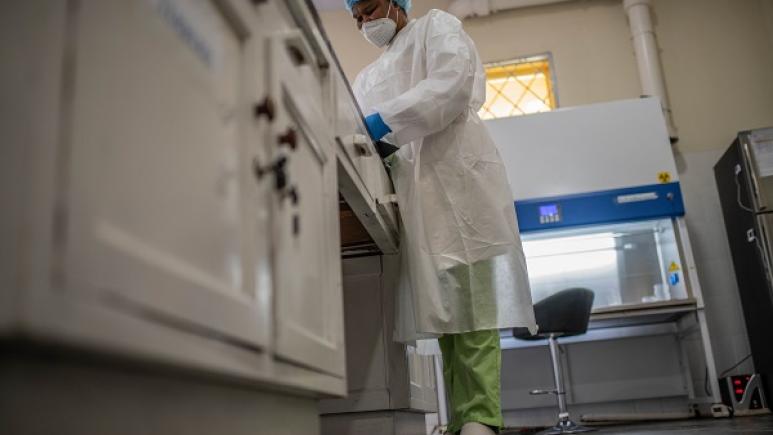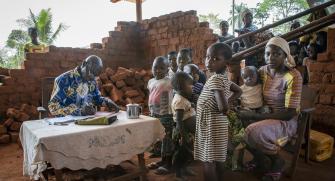Routine measles diagnosis in the DRC: What is the performance and feasibility of dried blood spot samples?
The DRC faces recurring measles epidemics, due to low vaccination coverage against this highly infectious disease. Between 2018 and 2020, the country faced its largest measles epidemic to date, with 26 provinces affected, more than 458,000 cases reported and 7,900 deaths (1). Since mid-2021, an increase in the number of cases has again been observed in several regions of the country (2).
URGEPI: a vast project to curb measles epidemics
In the provinces of Haut-Lomami, Haut-Katanga, Tanganyika and Lualaba (formerly Katanga), in the very south of the DRC, Médecins sans frontières (MSF) has been running the Urgepi project since 2018 to provide a better response to successive measles epidemics. Global surveillance is based on an alert system that takes epidemic risk into account. The risk varies geographically depending on vaccination coverage and previous epidemics.
If the threshold of suspected measles cases is exceeded in a health zone, an investigation is launched.
“The optimal threshold was chosen based on observations from historical data," explains Birgit Nikolay, who oversees Urgepi's epidemiological activities. We chose a threshold that is more sensitive in high-risk areas".
If the number of alerts exceeds the response capacity, areas are prioritised according to the risk and stage of the epidemic, as well as the number of cases in the last three weeks.
The Urgepi project comprises several components designed to improve responsiveness and response:
- Surveillance of all four provinces, with specific attention to high-risk health zones through earlier detection of alerts and more detailed data collection;
- Alert response with regular training for healthcare professionals in centres, and rapid intervention teams in case of a confirmed epidemic;
- Prevention, with catch-up vaccination campaigns in high-risk areas;
- The opening of a laboratory in Lubumbashi to reduce diagnosis confirmation times.
Gaps remain
Two laboratories - the one in Kinshasa and the new one in Lubumbashi - are now able to carry out Elisa tests to detect anti-measles IgM. To implement a reactive vaccination campaign in the DRC, which is essential for controlling an epidemic, two or three cases (depending on the health zone) need to be confirmed by Elisa from a serum sample. Admittedly, the situation has improved slightly with the opening of the 2nd laboratory in Lubumbashi, but many logistical challenges remain to ensure the rapid and efficient transport of samples in this country, the 11th largest in the world. In addition to the distances involved, transporting serum requires a cold chain, which is very often defective, and some carriers refuse to take on this type of sample.
"As a result, serum samples are not sent out, or are sent out with delays of up to several weeks, which degrades their quality and makes the results unreliable," explains Birgit Nikolay. The absence of timely confirmation of an epidemic by a laboratory can considerably delay the response to epidemics. An alternative would be to use Dried Blood Spots (DBS) for confirmation, and this is what we want to test as part of the Urgepi project.”
While serum samples are considered as the gold standard for the detection of anti-measles IgM by Elisa, the World Health Organization (WHO) recommends the use of DBS as alternative sample type where timely transportation of samples is impossible (3, 4).
“Antibodies were found to be sufficiently stable on DBS kept at a temperature below 37°C for case confirmation in areas where sample refrigeration is not feasible;” explains Birgit Nikolay. “And studies have shown that the sensitivity and specificity of DBS based Elisa is similar to serum-based Elisa (3, 4).”
However, their performance in routine surveillance and their acceptability to healthcare staff and local transporters have not yet been demonstrated in the DRC. The study launched by Epicentre will explore these aspects.
DBS and venous blood samples will be collected from each patient with clinical suspicion of measles based on national surveillance guidelines The samples will then be sent to the Lubumbashi Laboratory for detection of measles IgM by Elisa. The sensitivity and specificity of the Elisa based on dried blood samples will be evaluated against the ELISA based on serum samples as the reference standard. The study will also assess whether it is acceptable to healthcare staff and local carriers to replace serum samples with DBS samples in the future.
If the results of the study prove positive, the use of dried blood instead of serum could reduce the time taken to confirm cases and therefore facilitate intervention before the epidemic progresses substantially.
Crédit Photo Moses Sawasawa
-
Nikolay, Birgit, Simons, Erica, Gignoux, Etienne. Description d’une épidémie nationale de rougeole, RDC, 2018-2020. Medecins sans Frontieres, Epicentre, 2020.
-
Ministry of Health DRC. National surveillance data DRC (IDS). .
-
Manual for the Laboratory-based Surveillance of Measles, Rubella, and Congenital Rubella Syndrome. https://www.who.int/publications/m/item/chapter-1-manual-for-the-laboratory-based-surveillance-of-measles-rubella-and-congenital-rubella-syndrome (accessed Feb 6, 2023).
-
Centers for Disease Control and Prevention (CDC). Recommendations from an ad hoc Meeting of the WHO Measles and Rubella Laboratory Network (LabNet) on use of alternative diagnostic samples for measles and rubella surveillance. MMWR Morb Mortal Wkly Rep 2008; 57: 657–60.









